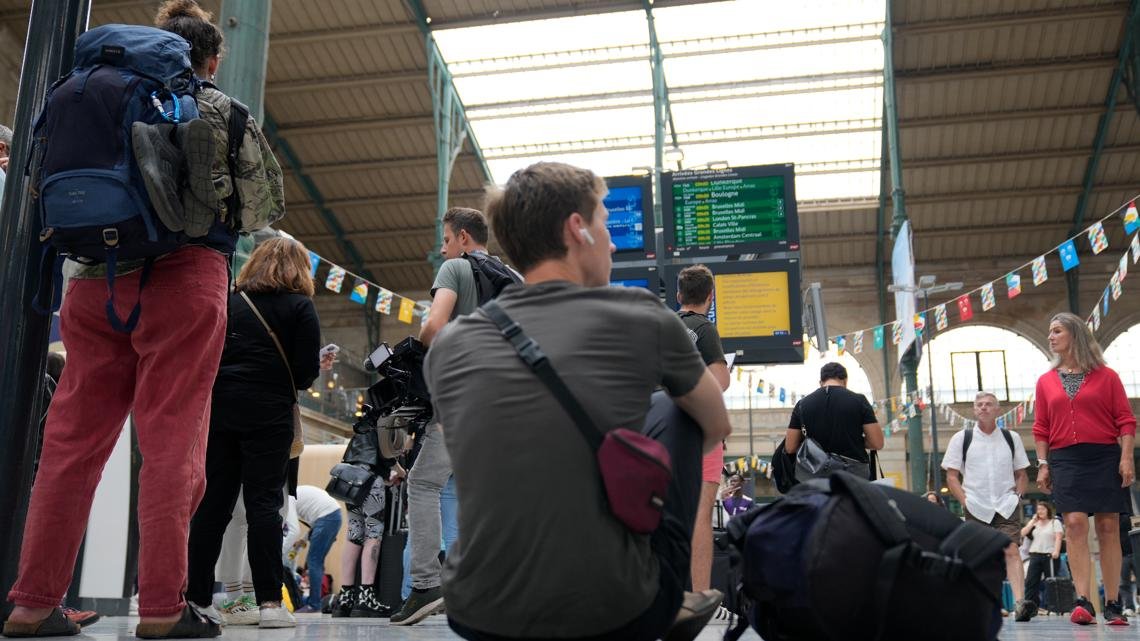Business
Arson Attack Cripples French High-Speed Rail Network on Eve of Olympic Opening Ceremony

French officials condemned the attacks as “criminal actions,” though they said there was no sign of a direct link to the Games.
PARIS, France — Arsonists targeted France’s high-speed rail network early Friday, disrupting travel to Paris for around 800,000 passengers, including Olympic athletes destined for the evening’s grand opening ceremony.
Authorities immediately denounced the attacks, labeling them “criminal actions,” and stressed there was no direct link to the Games. Paris prosecutors launched a national investigation into the acts of sabotage, which could carry severe penalties.
Amid the chaos, Sarah Moseley, a 42-year-old traveler, was stranded at Gare du Nord due to a delayed train to London. “It’s a hell of a way to start the Olympics,” she remarked.
With Paris bracing for a grand opening ceremony along the Seine River, fires set near the tracks before dawn disrupted hundreds of thousands of travelers.
This wave of sabotage hit Olympic athletes as well. Two trains on the Atlantique high-speed line carrying athletes were halted, affecting their journey to Paris.
In another incident, German showjumping athletes Philipp Weishaupt and Christian Kukuk were forced to turn back in Belgium due to the closures, according to German news agency dpa.
Paris Mayor Anne Hidalgo assured that the rail attacks would not impact the opening ceremony, despite cloudy skies and rain threatening the event’s mood.
No injuries were reported. French Prime Minister Gabriel Attal called the sabotage “prepared and coordinated,” with the aim of crippling the high-speed train network.
Jean-Pierre Farandou, CEO of SNCF, attributed the incident to a deliberate effort to inflict maximum disruption by targeting key tracks.
Maintenance workers averted another sabotage attempt by spotting intruders who fled when noticed, highlighting the vigilance of the railway staff.
Repairs are ongoing as police conduct forensic examinations and search for perpetrators. The fires primarily damaged critical signaling cables, described as meticulous work by Farandou.
Transport Minister Patrice Vergriete announced partial resumptions in the afternoon, especially on Atlantique lines, signaling a gradual return to normalcy.
The sabotage came amid heightened global security measures for the upcoming 2024 Olympic Games in Paris.
Earlier this week, France’s interior minister blocked around 1,000 suspected threats, potentially on behalf of foreign powers, from attending the Games.
French intelligence remains vigilant, foiling several plots to disrupt the Olympics, including the recent arrest of a Russian man under suspicion of planning destabilizing activities.
The Paris police have deployed 35,000 officers daily for the Olympics, peaking at 45,000 for the opening ceremony, maintaining tight security amid these disruptions.
Basel-Mulhouse airport also faced an evacuation on Friday for safety reasons, though the link to the rail attacks remains unclear.
While Montparnasse station was particularly disrupted, passengers like Maiwenn Labbé-Sorin experienced significant delays and discomfort before returning to Paris.
Gare du Nord saw numerous travelers seeking guidance amid widespread delays affecting services to northern France, Belgium, and the UK.
German rail operator Deutsche Bahn reported cancellations and delays on routes between France and Germany, compounding the transportation issues.
The disruptions came just as 7,000 Olympic athletes were set to participate in a ceremonial sail down the Seine. German Chancellor Olaf Scholz voiced his condemnation of the attacks and expressed hope for swift identification of the perpetrators.
In response to the rapid recovery efforts, French cartoonist Plantu humorously depicted SNCF agents as Olympic gold medalists in a light-hearted tribute on Instagram.
Associated Press writers Tom Nouvian, Angela Charlton, James Jordan, Danica Kirka, and Samuel Petrequin contributed to this report.


















